Menu
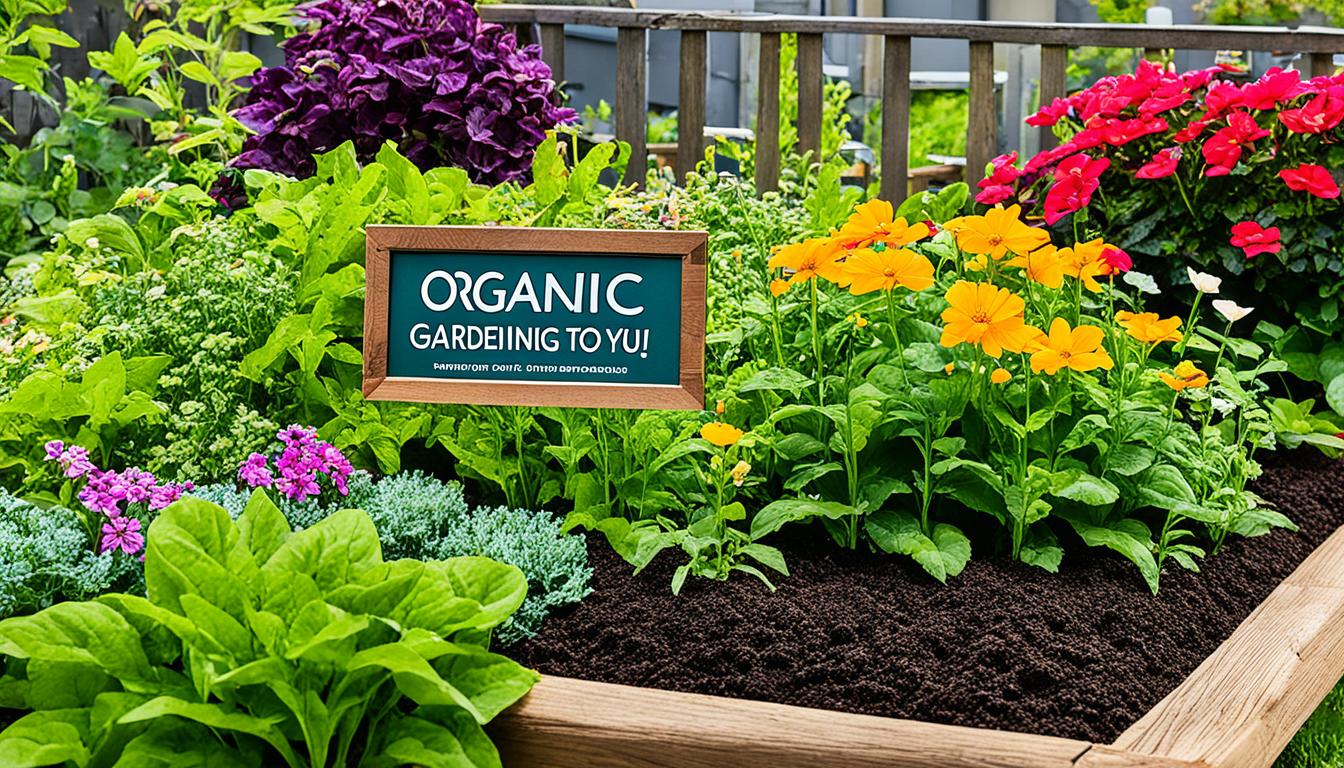
Did you know a single cubic foot of compost can weigh around 40 lbs? A cubic yard is even heavier, at about 1,100 lbs. This isn’t just waste—it’s packed with nutrients for your garden. Using organic soil amendments, we can make weak garden soil rich in nutrients. It contains vital nutrients like nitrogen, phosphorus, potassium, as well as magnesium, calcium, sulfur, zinc, and iron.
Robin Sweetser, a respected writer for The Old Farmer’s Almanac, points out how important these nutrients are. Organic soil amendments don’t just add nutrients. They also make the soil better, helping with aeration and drainage. Our method is green, using natural answers to care for our gardens. Let’s see how these organic boosts can improve your gardening.
Organic soil amendments, known as natural soil enhancers, naturally improve soil health. They’re not like synthetic fertilisers. They make gardens healthier and more fruitful.
Organic soil amendments come from natural sources. They are added to soil to make it better. These soil conditioners boost organic matter in the soil. This is key for soil health. Most plants love soil with 5%-10% organic matter. So, these amendments are a hit.
One major plus of these amendments is how they boost soil aeration and drainage. They make soil more porous. This helps roots get more air and water. Plus, they make the soil hold more nutrients. This supports strong plant growth. Things like compost and manure are full of what plants need. They’re like natural fertilisers but better.
There are many kinds of organic soil enhancers. They meet different soil needs. Let’s look at the main types:
Using organic soil amendments in your garden helps in many ways. It makes the soil better now and in the future. This improves sustainability and fertility.
A garden’s energy comes from primary plant nutrients, secondary soil nutrients, and key micronutrients. These are vital for healthy plant growth.
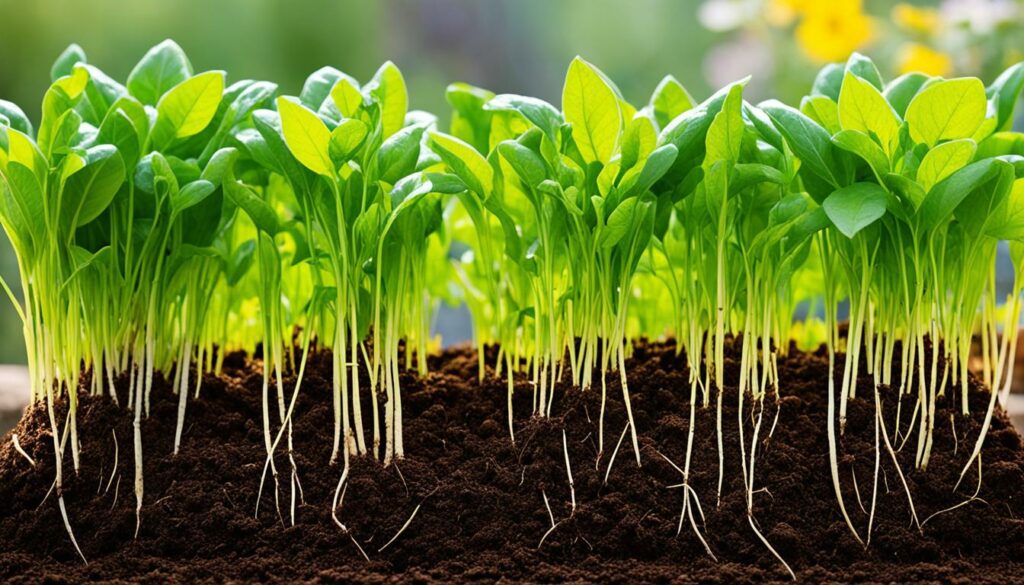
Plants need lots of nitrogen, phosphorus, and potassium to grow well. For example, vegetables growing on one acre need over 100 pounds of these nutrients each year. Nitrogen helps plants grow leaves. Phosphorus is good for roots and fruit but too much can pollute water. Potassium boosts plant health and fights off diseases.
Plants also require magnesium, calcium, and sulfur but in smaller amounts. Not having enough magnesium shows in the older leaves first. Sulfur lack is common in sandy soils during spring. Calcium reduces nitrates and is more available in soils with clay or organic matter. That’s because they keep more potassium.
Zinc and iron are needed in tiny amounts, less than half a pound per acre. Yet, they play key roles in plant functions. Zinc boosts enzymes and proteins. Iron is essential for making chlorophyll and keeps the plant strong. Having the right micronutrients makes a garden healthier and more productive.
Adding organic soil amendments to gardening has big paybacks. It enhances soil structure and fertility. It makes the soil more aerated and improves drainage. This method brings life to the garden.
These amendments boost soil fertility. They’re full of good stuff like potassium and nitrogen. These nutrients are key for strong plant growth. Also, there are many helpful bacteria and tiny organisms. They break down nutrients, making them easy for plants to use.
Physical organic soil is better than chemically treated soil. It holds water well, giving plants what they need. This cuts down on water waste and makes gardens sustainable. Good soil structure also means fewer plant diseases and less erosion.
Organic additions like compost improve air in the soil. They make more room for air and water. This is vital for roots and helps avoid waterlogging or dryness.
No chemicals in these amendments keep soil safe. This ensures good drainage, stopping root rot. It helps plants grow strong and healthy.
Ultimately, these organic amendments turn poor soil into a fertile, well-drained, and aerated topsoil. This is the best space for plants to flourish.
Organic soil amendments are key for a strong garden. It’s vital to pick the right kind for the best plant growth. We’ve split them into animal, mineral, and plant types for you.
Things like manure and worm castings are great for the soil. They add lots of nutrients. Manure slowly feeds the soil with nitrogen and phosphorus. A cubic foot of compost weighs about 40 lbs, showing how effective it is in boosting soil fertility.
Worm castings also pack lots of minerals and nitrogen. They do wonders for soil and plants. Compost made from manure is packed with more nutrients than plant compost. So, it’s a top choice for healthy soil.
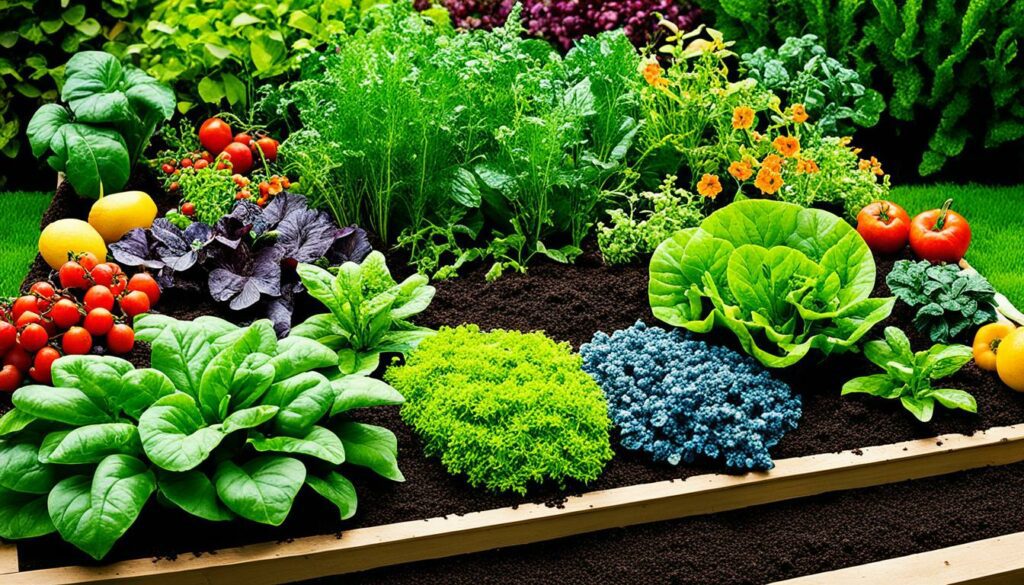
Mineral supplements fix soil mineral problems. Greensand is great for clay. It adds potassium and minerals to hold water. Gypsum, meanwhile, improves soil structure. It helps roots grow by adding essential minerals.
Always soil test first if you’re using these amendments. This tells you what your soil needs. Yet, rock dust is great as it adds many minerals straight to the soil.
One cubic yard of compost typically weighs about 1,100 lbs, making it a highly concentrated source of nutrients, beneficial for both small and large gardening areas.
Compost and leaf mold are perfect for the soil. They improve soil and help good bacteria grow. Compost makes the soil better at holding water and nutrients. It takes about 8.33 cubic feet to cover 100 sq. ft. of garden by an inch deep.
Leaf mold is old leaf mulch. It adds minerals and helps the soil keep water. Both compost and leaf mold support healthy, green gardening.
Choosing and using organic soil enhancers makes soil great for plants. Animal, mineral, and plant types all help your garden thrive. They turn dirt into a rich, growing space.
Testing your soil helps you learn about its health and what nutrients it has. This ensures your plants can grow well. It’s a good idea to test your soil every three to five years to keep it in good shape.
DIY soil tests can quickly show your soil’s pH and key nutrients. These kits give a simple overview, making it easier for gardeners to know what to do next. Remember, homemade test kits might not be as accurate as professional ones.
Basic tests for pH, texture, and moisture using household items can give you a starting point. But always consider professional advice for more detailed soil info.
If you want an in-depth soil check, think about professional testing. Local county offices or agricultural labs offer this service. This analysis will tell you everything about your soil’s nutrients, like nitrogen and potassium. It helps you make the soil perfect for plant growth.
Knowing how to read soil test results is important. It tells you which nutrients are low and what your soil’s pH is. These details help you know what your soil needs to be healthy for plants.
Sometimes, your soil might need extra nutrients like calcium or potassium for plants to grow their best. Use the test results to add the right amendments, like rock phosphate for phosphorus. This ensures your plants get what they need to thrive.
A soil pH of 5.5 to 7 is good for most plants. Adjust your soil’s pH and nutrients based on the test results. This will help your garden be fertile and productive.
Using soil amendments well is about sticking to the right methods. It’s crucial to know the best way to apply and when to apply. This helps your plants the most.
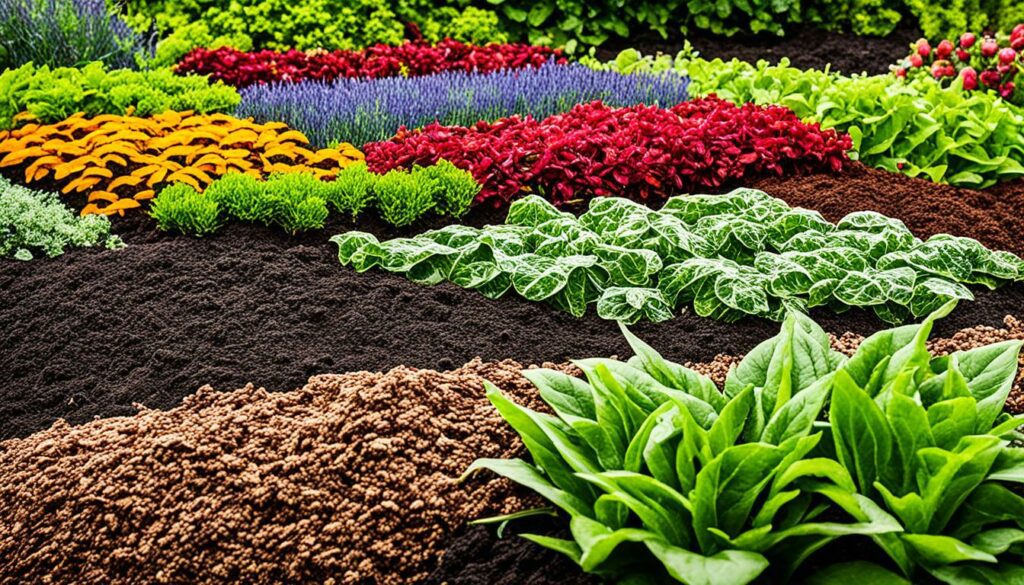
When to add amendments and how often depends on what you use and your plants’ needs. For instance, putting compost on at a 1″ layer each year is great for healthy beds. Or, add 2″-3″ if your soil needs more organic matter. Make sure to read the instructions on the product for the right amounts. Doing this at regular times, like every season, keeps your soil in good shape.
There are different ways to apply amendments so your plants get the most benefit. Methods range from spreading by hand for a small area to using a machine for larger spaces. It’s key to measure your garden to know how much you need. For example, to put 3″ of compost in a 200 square foot area, you’ll need 1.85 cubic yards of compost. You can also mix in worm castings for a slow boost or spread mulch on top to keep in moisture and maintain a good temperature.
At Spotts Garden Service, we test your soil and provide the best amendment plans. Knowing what your soil needs, whether it’s more air in clay or more water in sand, is vital. This approach helps your garden grow healthier over time.
| Soil Condition | Recommended Amendment | Application Rate |
|---|---|---|
| Kitchen Garden Beds | Compost | 1-3″ annually |
| Clayey Soils | Organic Material | Varies by need |
| Sandy Soils | Water Retentive Material | As required |
| General Garden Bed | Compost | 2 pounds per 100 sq ft |
Comparing organic and chemical fertilisers shows big differences. Organic methods benefit both the earth and soil health over time. Meanwhile, chemical fertilisers give fast results but harm the environment.
Chemical fertilisers, while cheap and long-lasting, pollute our planet. They can end up in water systems, causing harm to fish and plants. These fertilisers are also not as rich in nutrients as natural options, needing frequent re-applying.
On the flip side, organic fertilisers provide nutrients naturally and fit with sustainable gardening. Things like animal waste and veggie scraps help soils. They slowly release nutrients, improving soil over time.
They also last longer, helping plants steadily over many months. This keeps the soil healthy without the need for constant upkeep. While it takes time to switch to organic (up to three years!), the health of the soil as a result is worth it.
| Criteria | Organic Fertilisers | Chemical Fertilisers |
|---|---|---|
| Release Rate | Slow-release over weeks | Immediate to quick release |
| Environmental Impact | Eco-friendly gardening practices | Waterway pollution risk |
| Nutrient Content | Rich in diverse micronutrients | Measured levels, often lacking diversity |
| Cost | Generally more expensive | Less expensive, longer shelf life |
| Application Frequency | Infrequent applications | Frequent applications needed |
The choice between them highlights the importance of earth-friendly options. Long-term soil health and green gardening lead to a better, more lush garden.
Keeping your garden healthy and colourful is important. You need to add essential garden minerals through different natural mineral amendments. These minerals help plants get the nutrients they need to grow well.
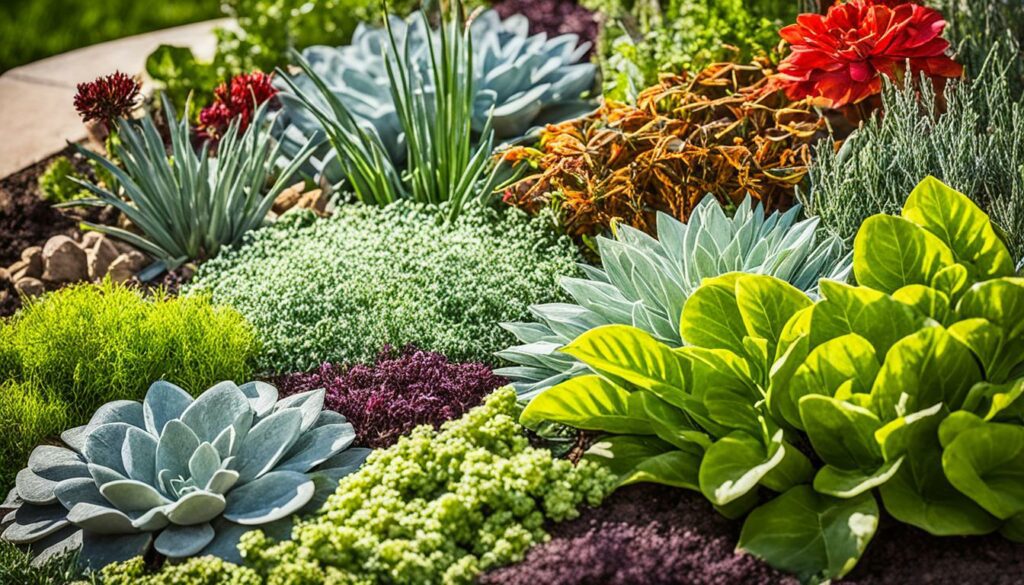
Aragonite is perfect for gardens lacking in calcium. This effective mineral supplement boosts the strength of plants by improving their cell walls. Azomite, however, is packed with over 60 trace minerals. It enriches the soil, supporting better plant growth with a range of nutrition.
Dolomitic limestone does two jobs – it fixes the soil pH and gives plants vital nutrients like calcium and magnesium. It’s great for acidic soils. Granite meal, on the other hand, slowly supplies potassium and trace minerals. This gentle supply system keeps the soil balanced over a long time, fitting many garden types.
| Mineral Supplement | Primary Benefit | Additional Benefits |
|---|---|---|
| Aragonite | Provides Calcium | Improves cell wall structure, Strengthens plants |
| Azomite | Enhances Mineral Content | Supports optimal growth with 60+ trace minerals |
| Dolomitic Limestone | Corrects Soil pH | Supplies calcium and magnesium |
| Granite Meal | Releases Potassium Slowly | Provides trace minerals without altering soil pH |
Organic nutrient meals are excellent for soil health and strong plants. These meals are full of vitamins, minerals, and compounds that plants love. They are a green choice instead of chemical fertilisers.
Take alfalfa meal, for example. It boosts plant growth and helps plants take in more micronutrients. Kelp meal, made from seaweed, is also great. It has lots of trace minerals, amino acids, and enzymes to help plants and roots grow.
| Organic Nutrient Meal | Primary Nutrients | Additional Benefits |
|---|---|---|
| Alfalfa Meal | Rich in nitrogen | Enhances microbial activity, improves soil texture |
| Kelp Meal | Trace minerals, amino acids, enzymes | Stimulates root growth, boosts plant resilience |
| Bone Char | Phosphorus | Easy nutrient uptake, supports flowering and fruiting |
| Blood Meal | Highly concentrated nitrogen | Serves as a deer deterrent |
Picking these organic options helps the soil and our plants. Using natural sources feeds the soil, making our gardens flourish. It leads to stronger plants and better harvests. With things like Azomite, which has 60 minerals, the soil gets even better. This supports plant growth with a full range of nutrients.
Cover crops act as natural soil boosters. They offer benefits such as fixing nitrogen, stopping soil erosion, and making organic matter in the soil better. They help improve our soil and keep agriculture sustainable.

Cover crops help the environment a lot. They upgrade the ecosystem and back sustainable farming. Adding organic matter to any soil improves it for plant growth. Cover crops are key in cutting down soil erosion, holding water, stopping weeds, and making the soil full of life. This approach keeps gardens strong and able to renew themselves.
Cover crops come in many types, each meeting different gardening and soil needs.
The “Estimating Nitrogen & Dry Matter from Cover Crops” article explains the need to measure the benefits of these crops. This is pivotal, especially in places like the Northern Willamette Valley.
Starting cover crops needs smart planning to get the most from them. Below is a simple guide:
Many books, like “Managing Cover Crops Profitably” and “Cover Crops for Vegetable Growers,” show how to use cover crops. They give detailed steps for successful farming with cover crops.
To wrap up, cover crops are fantastic for the soil. They boost organic matter and fix nitrogen well. By choosing different types and following good farming practices, we improve soil health. This leads to better, sustainable farming.
Composting is key in sustainable gardening. It turns organic waste into a soil booster. This way, we can support our gardens without harming the planet.
It helps by improving soil quality. This means better air, water, and life in the soil. And it’s all natural.
Starting a compost pile is easy. You need both greens and browns, with a little water. Greens are things like food scraps and coffee grounds. Browns, such as leaves, are mostly dry stuff. Aim for three parts browns to one part greens. Keep it as damp as a wrung-out sponge.
Adding kitchen scraps, yard trimmings, and grass to the pile is good. It helps the compost reach the right nutrient levels. With enough organic matter, your plants will do great.
Caring for your compost makes it work better. Turn the pile every week or two. This keeps it fresh and speeds up how fast it turns into nutrient-rich soil.
Checking the temperature matters too. It should be 135°F to 160°F. This heat kills harmful germs and weed seeds.
“Stability in compost is achieved when the sample releases less than 8 mg of CO2-C per gram of compost per day, marking it as ready to enrich your soil,” advises the US Composting Council (USCC).
Testing the compost helps to see how good it is for your plants. A typical mix of compost has numbers like 1.0-0.5-1.0. This means it’s a good meal for plants. It improves water holding and fertility of the soil too.
Following these tips will make your compost heap a success. Turning waste into valuable food for your garden helps nature. With care, compost becomes an essential part of a thriving, green space.
Eco-friendly soil fertilisers are a top choice over chemical ones. They’re great for those wanting to grow healthier plants and help the planet. They are made with natural materials, which improves the soil, boosts its life, and cuts down on harm to nature.
There are several kinds of green soil fertilisers like organic meals, compost, and worm castings. Each has its own special benefits for plants:
Using green fertilisers means better soil and plant health. It also means less harm to nature than chemical ones do.
Making organic fertiliser at home saves money and is good for the Earth. Here’s how to do it:
Adding eco-friendly fertilisers to your garden helps your plants grow. It also promotes caring for the Earth.
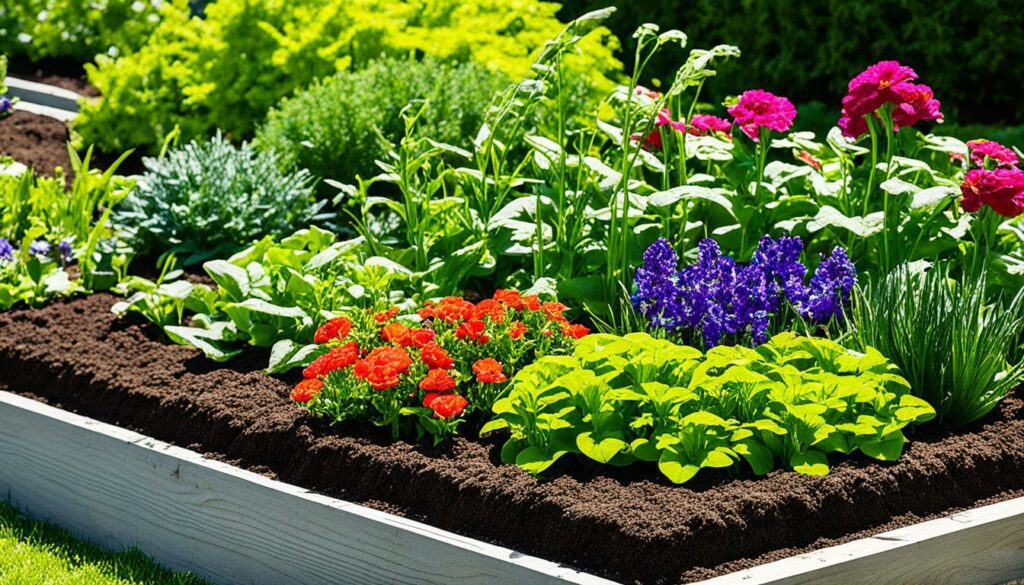
Using organic soil amendments is key for rejuvenating gardens in a natural way. They help make gardening sustainable for the future. We looked at types like compost, biochar, superabsorbent polymers, and mineral supplements. These enhance soil health, boosting fertility and supporting strong plant growth.
There’s proof that these amendments improve soil. They can increase soil pH from 3.2 to 7, a big jump. They also lower the amount of certain metals in the soil by more than 80%. This shows how well they work to better soil.
Materials like composted sewage sludge and steel mill slag make big differences in soil fertility and how well plants grow. Superabsorbent polymers help keep soil moist and less dense, making it better for roots. Other amendments like biochar and fertilizers, along with special microbes, are key for improving gardens in a green way.
In places with soil contaminated by metals, certain amendments have been shown to help. They use natural processes like precipitation and complexation to make soil safer. By using these methods, we can change our gardens naturally, promoting a healthier Earth. It’s important we keep exploring and using organic soil improvement methods to grow gardens that are both rich and friendly to the environment.
Natural options that help the soil are organic soil amendments. They increase organic matter, make soil airier, and boost drainage. This makes gardens healthier.
Nutrients like nitrogen, phosphorus, and potassium are vital for growing leaves, protecting from disease, and making flowers and fruit. They support the health and growth of plants.
By adding organic matter, these amendments better soil structure. They also help good microorganisms and let soil hold more nutrients and water. This improves aeration and drainage.
Worm castings and manure are animal-based choices. Greensand and gypsum are mineral-based. Compost and leaf mould come from plants.
Use DIY kits to check soil’s pH and nutrient levels. Or, get a professional to test for a full soil health check.
The best time to add amendments depends on your soil’s condition and the plants you’re growing. Knowing what your soil needs ensures the changes are helpful.
Organic amendments support soil and plant health without harming the environment. They keep the soil rich over time and reduce erosion.
Minerals such as aragonite and azomite give plants calcium and trace minerals. They balance soil and make sure plants get what they need for strong growth.
To start, mix green and brown waste and keep it damp. Then, regularly turn and check the compost. This will make your soil better and hold more moisture.
Cover crops are plants that make soil healthier. They stop erosion, add nitrogen, and boost organic matter. Legumes, grasses, and brassicas are common and each helps in special ways.
Make fertiliser by composting waste or brewing herbal teas. Doing this turns trash into plant food, offering a green way to garden.